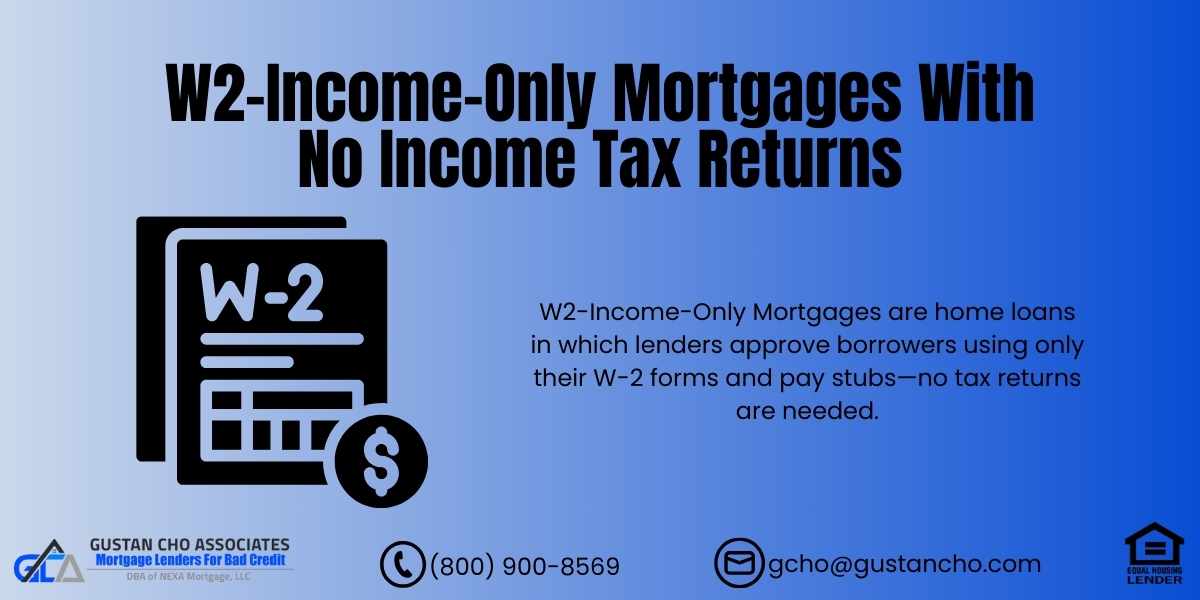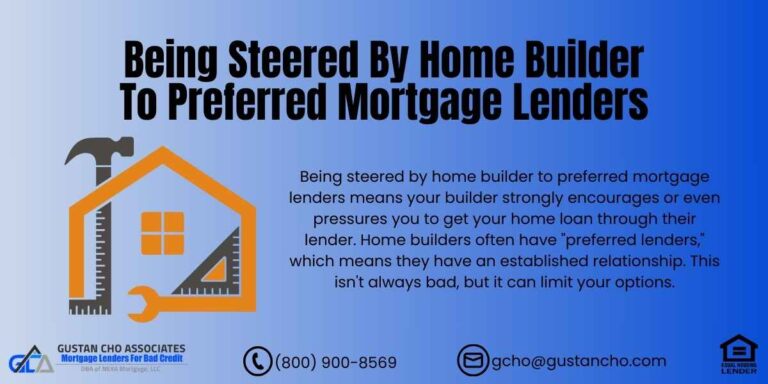W2-Income-Only Mortgages With No Income Tax Returns
W2-Income-Only Mortgages: A Simple Guide to Getting Approved Without Tax Returns
Are you a W2 employee looking to buy a home but worried about not having tax returns to show for income verification? W2-income-only mortgages could be your solution. These mortgage programs allow homebuyers to qualify using W-2 forms and pay stubs—no tax returns are required!
At Gustan Cho Associates, we specialize in mortgage options that make homeownership accessible for borrowers who might not fit traditional lending guidelines. Whether you’re a first-time homebuyer or looking to refinance, this guide will help you understand how W2-income-only mortgages work, who qualifies, and how to get started.
What Are W2-Income-Only Mortgages?
A W2-income-only mortgage is a loan program that allows borrowers to qualify based only on their W-2 income and pay stubs instead of tax returns. This option is ideal for W2 employees who may have complex tax filings, high deductions, or prefer a more straightforward mortgage approval process. Anyone who gets 1099 from a second job or has rental income on their income tax returns is not eligible for W2-income-only mortgages.
Unlike traditional mortgage applications that require tax returns, W2-income-only mortgages streamline the process, making it easier for W2 wage earners to get approved. These loans are available through FHA, VA, USDA, and Conventional loan programs, offering borrowers multiple options depending on their financial situation.
Get Pre-Approved for a W2-Income-Only Mortgage
Apply Now And Get recommendations From Loan Experts
Who Qualifies for a W2-Income-Only Mortgages?
To be eligible for W2-income-only mortgages, you must meet specific requirements:
- Must be a W2 employee (self-employed borrowers are not eligible)
- Stable employment history (typically 2 years, but exceptions apply)
- Minimum credit score of 580 (higher scores may qualify for better rates)
- Acceptable debt-to-income (DTI) ratio (typically 43%-50%)
- Provide the last two years of W2s and recent pay stubs
- Must be buying or refinancing a primary residence (not for investment properties)
Gustan Cho Associates can help you explore your options if you’re unsure whether you qualify.
Benefits of W2-Income-Only Mortgages
When securing a mortgage, many homebuyers face challenges due to various income documentation requirements. However, W-2-income-only mortgages offer a streamlined alternative that simplifies the approval process. By focusing solely on W2 income, these mortgage options provide significant benefits, making homeownership more accessible for many individuals. In this section, we’ll explore the key advantages of choosing W-2-income-only mortgages to help you make an informed decision.
1. No Tax Returns Needed
Many homebuyers struggle to qualify because tax returns show reduced income due to deductions. With W2-income-only mortgages, only W2 income matters.
2. Faster Approval Process
Lenders don’t have to analyze complex tax returns, which speeds up underwriting and approval.
3. Lower Down Payment Options
- FHA: 3.5% down payment (credit score 580+)
- Conventional: 3% down for first-time buyers, 5% for repeat buyers
- VA & USDA: 0% down for eligible borrowers
4. Competitive Interest Rates
W2 income is considered more stable than self-employment income, leading to lower interest rates compared to non-QM loan programs.
Types of Loans That Offer W2-Income-Only Mortgages

When considering mortgage options based solely on W2 income, it’s essential to understand the various loan types available to potential homeowners.
FHA Loans (Best for Low Credit Scores & High DTI)
FHA loans are designed to accommodate borrowing needs, especially for those who may not have perfect credit. People with a 580 credit score or higher can qualify for these loans, facilitating the path to homeownership; if you can provide a down payment of at least 10%, you could be eligible with a score as low as 500. Ronda Butts, a dually licensed realtor and loan officer at Mortgage Lenders For Bad Credit, explains the role of HUD on FHA loans:
FHA loans are the most popular loan program for individuals with lower credit scores, first-time homebuyers, and those with limited funds for the down payment. HUD, the parent of FHA, insures FHA loans originated and funded by private lenders. The government guarantee by HUD on FHA loans reduce the risk for lenders in the event borrowers default on their FHA loans.
A major benefit of FHA loans is their flexibility regarding DTI ratios, permitting borrowers to carry higher existing debt levels—up to 56.9%—which can encompass various monthly commitments such as credit card payments, student loans, and other types of loans. It’s important to remember that FHA loans come with the requirement of mortgage insurance (MIP), which adds to the overall cost of the loan but ultimately opens doors for many striving for homeownership despite financial hurdles
Conventional Loans (Best for Strong Credit Borrowers)
Conventional loans are a good choice for people with strong credit. You usually need a credit score of at least 620 to get this type of loan. One of the benefits of these loans is that they often have lower mortgage insurance costs, which you pay to protect the lender if you can’t pay your loan. These loans also come with more competitive interest rates, meaning you could save money on your monthly payments.
VA Loans (For Veterans & Active Military)
VA loans offer an excellent choice for veterans and active duty service members. They offer the big benefit of not needing a down payment, which means you can buy a home without saving much money upfront. VA loans also eliminate the need for mortgage insurance, reducing monthly payments and overall cost savings.
These loans have flexible debt-to-income requirements, making it easier for service members to qualify, even if they have other financial responsibilities. All these benefits make VA loans a smart choice for those who have served in the armed forces.
USDA Loans (For Rural & Suburban Areas)
With a 0% down payment requirement, purchasing a home can be more accessible for many buyers. This option also offers lower mortgage insurance costs, making homeownership more affordable in the long run. However, it’s important to note that the property must be located in a USDA-eligible area to qualify for these benefits. This program is designed to support those looking to buy in rural regions while easing the financial burden of purchasing a home.
Simplify Your Mortgage Approval – Get a Loan Based on Your W2 Income Only
Apply for a No Tax Return Mortgage Now
Step-by-Step Process to Get W2-Income-Only Mortgages
When securing a home loan, many people navigate a complex landscape of qualifying criteria and financial documentation. One option that has gained popularity for certain buyers is W2-Income-Only Mortgages. We will discuss the step-by-step process on how to qualify for W2-only income mortgages:
Step 1: Check Your Eligibility
The initial phase involves assessing your eligibility according to your W-2 earnings, credit rating, and work history. If you’re unsure, our team at Gustan Cho Associates can help evaluate your situation.
Step 2: Gather Required Documents
To apply for W2-income-only mortgages, you’ll need:
- Last 2 years of W-2s
- Recent pay stubs (last 30 days)
- Credit report & score check
- Employment verification (VOE)
Step 3: Get Pre-Approved
A mortgage pre-approval is important for people who have W2-Income-Only Mortgages. It helps you know how much money you can use to buy a home. Getting pre-approved also makes you look better when you want to buy a house. This means sellers take you more seriously when you make an offer.
Step 4: Find a Home & Submit Your Loan Application
After you receive an accepted offer, your lender will finalize the underwriting process utilizing only your W-2 income documentation.
Step 5: Home Appraisal & Underwriting
When applying for W2-Income-Only Mortgages, the lender will order an appraisal to ensure the home meets loan requirements. Underwriters will verify your employment and income.
Step 6: Clear to Close & Final Approval
Once underwriting is complete, you’ll receive a clear to close (CTC) and schedule a closing date.
Step 7: Closing Day – Get Your Keys!
Sign the final paperwork, complete your down payment and closing costs, and get the keys to your new home!
Get Pre-Approved for W2-Income-Only Mortgages Today!
At Gustan Cho Associates, we help people with W2 jobs get W2-Income-Only Mortgages without showing tax returns. This means we can assist first-time buyers, refinancers, and those who have been turned down by other lenders. Getting a home loan can be easy with our support! With W2-Income-Only Mortgages, you can qualify with W2 income only without showing your income tax returns on FHA, VA, USDA, and conventional loans, says Angie Torres, the National Operations Director at Mortgage Lenders For Bad Credit:
W2-Income-Only Mortgages offesr a viable option for borrowers who primarily earn income through W-2 wages and may have substantial unreimbursed business expenses on their income tax returns. This mortgage type simplifies income verification, enabling borrowers to qualify for a loan even with recent career changes or non-traditional income sources.
If you have any questions about W2-income-only mortgages or borrowers who need to qualify for loans with a lender with no overlays, please contact us at 800-900-8569 or email us at gcho@gustancho.com. The team at Mortgage Lenders for Bad Credit is available 7 days a week, on evenings, weekends, and holidays.
Self-Employed? Gig Worker? See If a W2-Income-Only Mortgage is Right for You
Apply Now And Get recommendations From Loan Experts
Final Thoughts
W2-income-only mortgages make homeownership more accessible by allowing borrowers to qualify using just W2s and pay stubs. With low down payments, competitive rates, and an easy approval process, it’s an excellent option for W2 employees looking to buy or refinance. Contact Gustan Cho Associates today, and let’s get you into your dream home!
Frequently Asked Questions About W2-Income-Only Mortgages:
Q: What are W2-Income-Only Mortgages?
A: W2-Income-Only Mortgages are home loans in which lenders approve borrowers using only their W-2 forms and pay stubs—no tax returns are needed.
Q: Who qualifies for W2-Income-Only Mortgages?
A: You might be eligible if you are a W2 employee earning a steady income, have a credit score of at least 580, and fulfill debt-to-income (DTI) criteria. Individuals who are self-employed, 1099 contractors, or own rental properties are ineligible.
Q: Why don’t I need tax returns for W2-Income-Only Mortgages?
A: Tax returns include business deductions that lower reported income, making qualifying harder. W2-Income-Only Mortgages use your gross income from W-2s to make approval easier.
Q: What types of loans offer W2-Income-Only Mortgages?
A: You can get W2-Income-Only Mortgages through FHA, VA, USDA, and Conventional loan programs—each with different down payment and credit score requirements.
Q: Can I qualify for W2-Income-Only Mortgages if I just changed jobs?
A: Yes! You can still qualify if your job is in the same industry or you’ve been working for at least two years. Lenders may also accept less than two years with a strong work history.
Q: How Much Down Payment do I Need for W2-Income-Only Mortgages?
A: The down payment for different types of mortgages are as follows:
- FHA: 3.5% down (580+ credit score)
- Conventional: 3% down for first-time buyers, 5% for others
- VA & USDA: 0% down (for eligible borrowers)
Q: Can I Use Bonuses and Overtime Income to Qualify?
A: Yes! If you’ve consistently received bonuses or overtime for two years, lenders will include it in your qualifying income for W2-income-only mortgages.
Q: What is the Debt-to-Income (DTI) Limit for W2-Income-Only Mortgages?
A: Most lenders allow a DTI of up to 50%, but FHA loans with strong credit and compensating factors can go up to 56.9%.
Q: Do W2-Income-Only Mortgages have lower interest rates?
A: Yes! Since W2 income is considered stable, lenders offer better rates than non-QM or bank statement loans.
Q: How do I Apply for W2-Income-Only Mortgages?
A: Contact Gustan Cho Associates to get pre-approved today! We offer no-lender-overlay W2-Income-Only Mortgages, making buying a home easy for W2 employees. 📞 Call or apply online!
This blog about “W2-Income-Only Mortgages Without Income Tax Returns” was updated on March 6th, 2025.
Not Sure If You Qualify? Get Personalized Help with W2-Only Mortgage Loans
Apply Now And Get recommendations From Loan Experts







